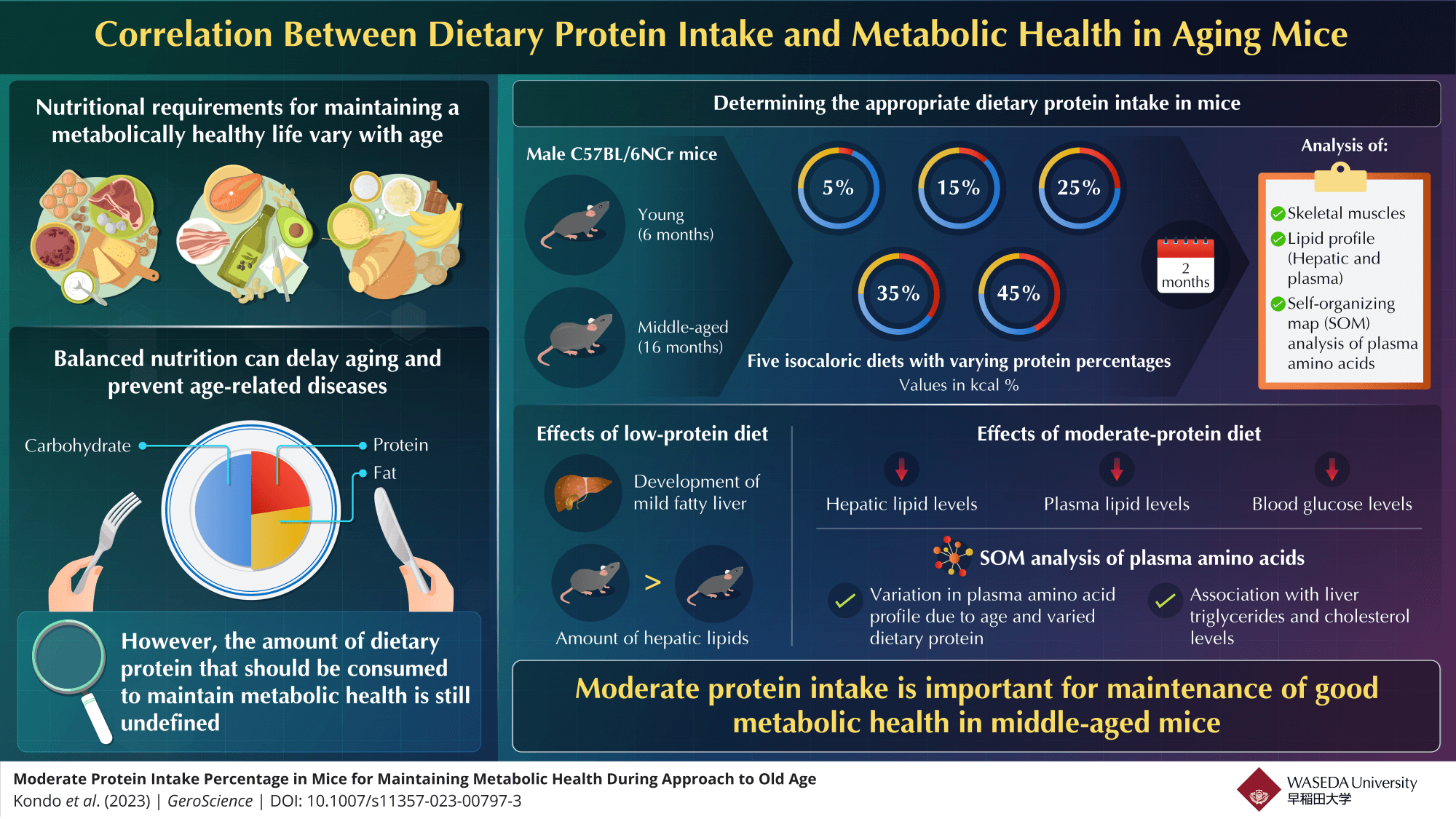TOKYO, Japan — The saying “you are what you eat” holds true when it comes to our health and longevity. A recent study conducted by researchers at Waseda University in Japan reveals that consuming a balanced diet with moderate protein levels can have a positive impact on metabolic health and delay aging.
The study involved feeding young and middle-aged mice with isocaloric diets containing different protein amounts, and the results showed that mice on moderate-protein diets had lower blood glucose and lipid levels. Understanding the relationship between nutrition and metabolic health is crucial for maintaining overall well-being and extending our lifespan. Previous research has shown that different nutritional interventions, including calorie and protein intake variations, can improve the health and lifespan of animals. However, the ideal amount of protein needed to maintain metabolic health has remained unknown.
In the study, the team led by Assistant Professor Yoshitaka Kondo explored the effects of protein intake on metabolic health in mice as they approached old age. Young and middle-aged male mice were given isocaloric diets with varying protein content for two months. The researchers assessed the impact of these diets on skeletal muscle weight, liver and plasma lipid profiles, and plasma amino acid profiles.

The findings revealed that a low-protein diet led to the development of mild fatty liver in middle-aged mice, while a moderate-protein diet reduced blood glucose and lipid levels in both young and middle-aged mice. Additionally, the plasma amino acid profiles showed a correlation between protein intake and hepatic triglyceride and cholesterol levels. The implications of this study on public health are significant.
“Protein requirements change through the court of life, being higher in younger reproductive mice, reducing through middle age, and rising again in older mice as protein efficiency declines,” says Kondo in a university release. “The same pattern is likely to be observed in humans. Therefore, it could be assumed that increasing daily protein intake in meals could promote metabolic health of people. Moreover, ideal dietary macronutrient balance at each life stage could also extend health span.”
By increasing daily protein intake, we can potentially promote metabolic health and extend our lifespan. Achieving an ideal macronutrient balance at each life stage becomes crucial for overall well-being.
The study is published in the journal GeroScience.
You might also be interested in:
- The bug diet? Insect protein may slow weight gain, promote better health
- Is Protein Powder Healthy? A Dietitian Gives You The Inside Scoop
- Low-fat or low-carb? Study reveals which diet leads to a longer life


This study is questionable at best. In limn, numerous animal studies (in a variety of species) has shown that dietary changes in the amount of protein, fat or carbs makes no difference to health span and life span of animals EXCEPT as it relates to a hypocaloric diet. Animals live longer on a hypocaloric diet no matter what proportions of protein, fat or carbs it contains.
This article is completely irrelevant, because 25 to 35% of what amount?
Wasted my time
Do the test on a carnivore. Like a Lion or a Human.
This study doesn’t mention if the mice fed less protein, had more carbs or fat to equalize the lesser amount of food do to less protein.
Mice and in-vitro studies mean nothing until tested in actual humans.
Animal testing is NOT predictive for humans. I thought we all knew this already.
Animal testing NOT predictive for humans. I thought we all knew this already.
Why not mention that the main source of protein in in the very plants that cattle and poultry eat for their protein needs? Would this be better than going through the middle man (animals)??
There is no protein in plants. They produce energy and fuel for other life forms of all kinds. Mammals are however, mainly protein. But there is only carbohydrates, vitamins, enzymes, mast and fibre in most plants.
Don’t need a Scientist to know this.. I certainly hope not, anyway!
All to no bloody avail if you’ve had the Jab.!
Looks like a Republican funded study, basically zero dollars and zero results
I read about a tribe of people in India who only eat meat. That is their culture. They don’t live as long as normal people from India. Not even close. They die in their 50’s and 60’s of kidney disease and various other problems.